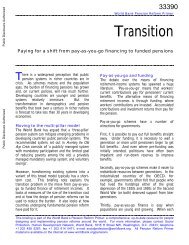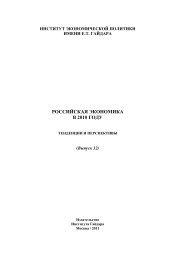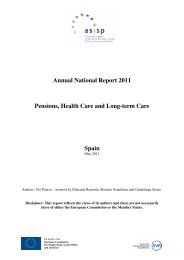Financial Sector Development in Africa: Opportunities ... - World Bank
Financial Sector Development in Africa: Opportunities ... - World Bank
Financial Sector Development in Africa: Opportunities ... - World Bank
Create successful ePaper yourself
Turn your PDF publications into a flip-book with our unique Google optimized e-Paper software.
64 Porteous<br />
such as Brazil (which now has 160,000 bank “correspondents,” or agents—<br />
quadruple the number a decade ago), the number of bank branches has<br />
not decl<strong>in</strong>ed markedly. In Brazil, as <strong>in</strong> Kenya, bank branches play a key role<br />
<strong>in</strong> the cha<strong>in</strong> of cash distribution, provid<strong>in</strong>g liquidity services to agents<br />
without which the agents would not be able to play their role of cash<br />
handlers. Hence, regulators must look beyond merely enabl<strong>in</strong>g agents to<br />
the wider question of the efficiency of the distribution structure of f<strong>in</strong>ancial<br />
services <strong>in</strong> general. Apart from merely licens<strong>in</strong>g agents, there may also<br />
be a case for review<strong>in</strong>g the often onerous and unclear requirements that<br />
regulate the creation of new bank branches (BFA 2010a).<br />
Third, enabl<strong>in</strong>g mobile f<strong>in</strong>ancial services requires <strong>in</strong>ter-agency coord<strong>in</strong>ation,<br />
s<strong>in</strong>ce at least two regulators are always <strong>in</strong>volved <strong>in</strong> some form: the<br />
f<strong>in</strong>ancial regulator and the telecommunications regulator. Indeed, the<br />
G20 Pr<strong>in</strong>ciples for Innovative <strong>F<strong>in</strong>ancial</strong> Inclusion call for cooperation and<br />
coord<strong>in</strong>ation across government agencies, 14 so that reforms <strong>in</strong> one area<br />
are not bottlenecked by contrary policies emanat<strong>in</strong>g from another regulator.<br />
Even if the MNO’s role is “simply” to be the data channel, communications<br />
regulators will oversee the quality and robustness of the channel<br />
(such as uptime) and will also have the purview to consider competition<br />
issues such as terms of access to mobile data services.<br />
Coord<strong>in</strong>ation also br<strong>in</strong>gs the hope of tak<strong>in</strong>g advantage of regulatory<br />
requirements <strong>in</strong> one sector to create benefit <strong>in</strong> another—which does not<br />
happen automatically. One current example of a large potential ga<strong>in</strong> from<br />
closer coord<strong>in</strong>ation may arise from the requirement that prepaid<br />
customers register and prove their identity <strong>in</strong> order to have cont<strong>in</strong>u<strong>in</strong>g<br />
access to the service. Of 44 <strong>Africa</strong>n countries surveyed (see annex 2.A),<br />
only 9 countries currently require registration of SIM cards with some<br />
process for verify<strong>in</strong>g identity. This requirement is new. But more countries<br />
are actively follow<strong>in</strong>g suit. The requirements for SIM registration are<br />
very similar to those typically required for customer due diligence on<br />
basic bank accounts. This means that a SIM registration process could be<br />
designed so as to also satisfy bank<strong>in</strong>g know-your-customer (KYC)<br />
requirements, at least for a basic account on a tiered approach to KYC. If<br />
this happened, everyone with a registered SIM would not only have a<br />
unique electronic ID number (the phone number) but would also be preverified<br />
for a basic account as well. One of the largest hurdles to great<br />
banked access—that is, the high costs of open<strong>in</strong>g an account—could be<br />
greatly mitigated. However, as a recent Cenfri report (2010) shows <strong>in</strong> the<br />
case of South <strong>Africa</strong>, 15 a lack of explicit and deliberate coord<strong>in</strong>ation<br />
between the telecommunication authorities and the f<strong>in</strong>ancial authorities







